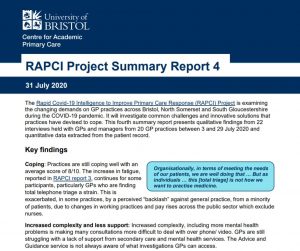Investigating changing demands on primary care during COVID-19: Summary report 4
11 August 2020
The Rapid COVID-19 intelligence to improve primary care response (RAPCI) project is examining the changing demands on GP practices across Bristol, North Somerset and South Gloucestershire during the COVID-19 pandemic. It will investigate common challenges and innovative solutions that practices have devised to cope.
This fourth summary report presents qualitative findings from 22 interviews held with GPs and managers from 20 GP practices between 3 and 29 July 2020 and quantitative data extracted from the patient record.
Overview of findings
We found that practices are still coping well. Practices are still coping well with an
average score of 8/10. The increase in fatigue, reported in RAPCI report 3, continues for some
participants, particularly GPs who are finding total telephone triage a strain. This is
exacerbated, in some practices, by a perceived “backlash” against general practice, from a minority
of patients, due to changes in working practices and pay rises across the public sector which exclude nurses.
Increased complexity, including more mental health problems, is making many consultations more difficult to deal with over phone/ video. GPs are still struggling with a lack of support from secondary care and mental health services. The Advice and Guidance service is not always aware of what investigations GPs can access.
Practices are keen to keep some benefits of new ways of working and avoid a return to unfiltered demand but are finding it a challenge to implement the right system to do this. Practices are variously: introducing online triage to manage demand, new appointment slots and timed telephone appointments, encouraging greater receptionist triage.
Practices are continuing to improve remote management to manage down face-to-face contact, e.g. self-service station for chronic conditions, encourage patients to self-management, use of Florey surveys to stratify patients. Nurses have found remote management for chronic conditions monitoring particularly useful. GPs are lowering their risk threshold for seeing patients face-to-face when the cases are complex and some are finding it difficult to establish a threshold for this.
Citing this report
This report should be cited as:
Murphy, M. Turner, A. Denholm, R. Scott, L. Scott, A. Macleod, J. Salisbury, C. Horwood, J. RAPCI Project Summary Report 4, 31 July 2020. Centre for Academic Primary Care (CAPC), University of Bristol.
Available from
https://www.bristol.ac.uk/media-library/sites/primaryhealthcare/documents/RAPCI-Project-Summary-Report-4-31July-2020.pdf
Download the full report
